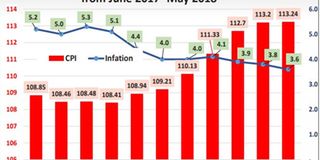Inflation kept in check in 2017/18

What you need to know:
- The headline inflation rate averaged at 4.4 per cent in the period between June 2017 to May 2018. The speed of price change for commodities in the period was below the government’s target of between 5.0 and 8.0 per cent rate. “We are targeting to contain inflation at a single digit in the range of 5.0 to 8.0 per cent in 2017/18 financial year,” said last year the minister for Finance, Dr Philip Mpango in his budget speech in June 2017.
Dar es Salaam. The government has managed to maintain a single digit inflation rate for eleven months of the financial year 2017/2018, a feat that economists say is commendable.
The headline inflation rate averaged at 4.4 per cent in the period between June 2017 to May 2018. The speed of price change for commodities in the period was below the government’s target of between 5.0 and 8.0 per cent rate. “We are targeting to contain inflation at a single digit in the range of 5.0 to 8.0 per cent in 2017/18 financial year,” said last year the minister for Finance, Dr Philip Mpango in his budget speech in June 2017.
And when tabling the 2018/19 budget for the ministry of Finance and Planning Dr Mpango said the average inflation rate in2017 was 5.3 per cent and has continued to decline to reach 3.8 per cent in April, 2018.
The decline in inflation has been attributed to increased food production, stability of the value of the shilling against foreign currencies, improvement in the production of electricity, the consistent implementation of monetary policy, a good trend of the balance of foreign exchange earnings, as well as the management of the budget. According to the National Bureau of Statistics (NBS), the stable inflation rate at a single digit was also kept in check by slower rate of inflation in three dominant factors in the basket of goods upon which inflation is measured in Tanzania.
The three categories are food and non-alcoholic beverages which account for 38.5 per cent of the Consumer Price Index (CPI), Transport which accounts for 12.5 per cent of CPI and Housing, Water, Electricity, Gas and Other Fuel which account for 11.6 per cent of CPI. These here have recorded a single digit inflation rate of 6.5 per cent, 0.6 per cent and 9.3 per cent respectively.
During the first five month of the financial year the inflation rate was about 5 per cent. The highest inflation rate of 5.3 per cent was recorded in September 2017 mainly attributed by the high speed of the increase in prices of food and non-alcoholic beverages by 9.3 per cent.
Since the start of November last year inflation rate dropped to 4.4 per cent and it has continued to decrease up to 3.6 per cent in May 2018. This is the lowest inflation rate to have ever been recorded in 14 years since May 2004 when it was 3.6 per cent. The decrease in inflation rate in the year ending May 2018 was mainly attributed to the decrease in the rate of increase in prices of food and non-alcoholic beverages by 2.6 per cent, communication services by 0.1 per cent and transport by 1.9 per cent.
On the other hand the consumer price index (CPI) which measures changes in the price level of market basket of consumer goods and services purchased by households has averaged 110.3 in that period. Prof Honest Ngowi, professor of economics at the Mzumbe University says lower inflation is good for the country’s development, as it stimulates investment and consumption.
“Macroeconomics policies by also consider balance of payments, trade and exchange rates” he said and added that rain have
He added that, government development expenditure must consider people welfare by providing opportunities to them.




